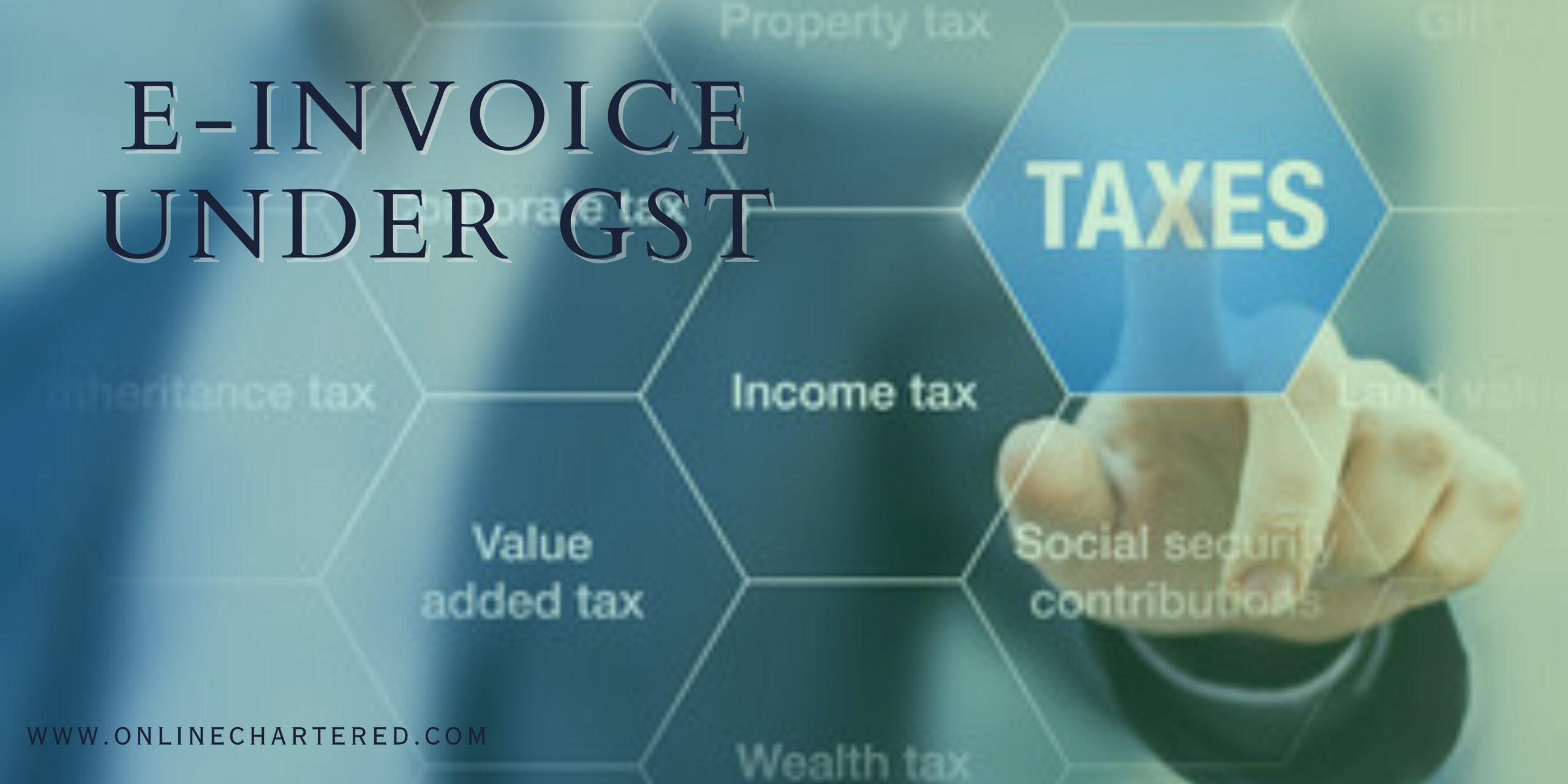E-invoice under GST

E-invoice under GST
The introduction of the Goods and Services Tax (GST) in India revolutionized the country’s tax system, simplifying compliance and streamlining business processes. As part of its ongoing efforts to enhance the efficiency of GST, the government introduced the concept of E-Invoice under GST. This article will provide a comprehensive overview of the latest update on e-invoice under GST, its benefits, and the implementation process.
What is an e-invoice?
E-invoice or electronic invoice, refers to the digital generation and exchange of invoices between business to business(B2B) in a standardized format. Under the GST regime, it aims to automate the invoice generation process, reduce errors, and improve tax compliance. E-invoice ensures that invoices are authenticated by the government’s Invoice Registration Portal (IRP), which generates a unique Invoice Reference Number (IRN) and a Quick Response (QR) code for each invoice.
Latest Update: Mandatory Applicability
As of the latest update, e-invoice has become mandatory for businesses meeting specific turnover criteria. From August 1, 2023, all businesses with an aggregate turnover exceeding INR 5 crore in any financial year must comply with e-invoice regulations. This significant step by the government aims to promote digitalization, enhance transparency, and streamline the invoicing process for large enterprises.
Implementation Process
To comply with e-invoicing regulations, businesses need to follow these steps:
- Update Accounting/ERP Systems: Businesses should update their accounting or ERP systems to incorporate e-invoicing functionalities or integrate with third-party software providers offering e-invoicing solutions.
- Register on the Invoice Registration Portal (IRP): Businesses need to register on the government’s designated IRP to generate and authenticate e-invoices. The IRP will assign a unique IRN and a QR code to each invoice.
- Generate E-Invoices: Once registered, businesses can generate e-invoices in the specified format, including all mandatory fields and digital signatures.
- Report E-Invoices in GST Returns: The details of e-invoices generated during a tax period must be reported in the GST returns, such as the GSTR-1 and GSTR-3B.
Sample of E-Invoice

What are the mandatory fields of an e-invoice?
- Document Type Code
- Supplier Legal Name
- Supplier GSTIN
- Supplier Address
- Supplier Place
- Supplier State Code
- Supplier Pincode
- Document Number
- Preceding Invoice Reference and Date
- Document Date
- Recipient Legal Name
- Recipient’s GSTIN
- Recipient’s Address
- Recipient’s State Code
- Place of Supply
- State Code
- Pincode
- Recipient Place
- Dispatch From Name,
- Address, Place, and Pincod
- Supply Type
- CodeItem Description
- HSN Cod
- Item Price
- Assessable Value
- GST Rate
- IGST Value, CGST Value, and SGST Value Separately
- Total Invoice Value
Benefits of E-Invoice:
1. Enhanced accuracy and reduced errors
With e-invoicing, businesses can significantly reduce errors caused by manual data entry. The automated process minimizes the chances of mistakes, ensuring accurate data transmission and record-keeping. This accuracy contributes to improved compliance and helps avoid penalties due to incorrect or incomplete invoices.
2. Streamlined Business Operations
E-invoicing simplifies the invoicing process, making it quicker and more efficient. It eliminates the need for manual paperwork, reducing administrative burdens. Businesses can generate invoices seamlessly, reducing processing time and freeing up resources to focus on core activities.
3. Faster Payment Processing
By adopting e-invoicing, businesses can expedite payment processing cycles. With accurate and standardized invoice data, payments can be processed swiftly, reducing payment delays and enhancing cash flow management.
4. Improved GST compliance
E-invoicing ensures that invoices generated are in line with the GST regulations and guidelines. This helps businesses comply with the statutory requirements, avoiding penalties and legal complications. The standardized format of e-invoices also facilitates easy reconciliation of GST returns and simplifies the auditing process.
5. Reduced tax evasion and fraud
E-invoicing acts as a powerful tool to curb tax evasion and fraudulent activities. The real-time reporting and transparency provided by e-invoices make it difficult for businesses to manipulate or underreport transactions. This leads to a fairer and more accountable taxation system.
Frequently Asked Questions
Q: Is e-invoicing mandatory for all businesses?
A: As of August 2023, e-invoicing is mandatory for businesses with an aggregate turnover exceeding INR 5 crore in any financial year.
Q: Are there any exceptions or sectors exempt from e-invoicing?
A: Currently, there are no exceptions or sectors exempt from e-invoicing. All eligible businesses need to comply with the e-invoicing regulations.
Q: Why is e-invoicing important under GST?
A: E-invoicing is crucial under GST as it simplifies the invoicing process, enhances accuracy, streamlines operations, and ensures compliance with GST regulations. It helps businesses improve efficiency, reduce errors, expedite payment processing, and avoid penalties.
Q: What are the benefits of e-invoice under GST?
A: The benefits of e-invoicing under GST include enhanced accuracy, streamlined business operations, faster payment processing, improved GST compliance, and reduced tax evasion and fraud.
Q: Is e-invoice mandatory for all businesses under GST?
A: No, e-invoice is mandatory for businesses with an annual turnover exceeding Rs. 5 crores as of August 1, 2023, as determined by the government.
Q: How does e-invoice work under GST?
A: Under GST, businesses generate e-invoices using their accounting or ERP software, upload them to the Invoice Registration Portal (IRP) for validation, and obtain a unique
Q: What role does e-invoicing play in curbing tax evasion?
A: E-invoicing plays a significant role in curbing tax evasion by promoting transparency and real-time reporting. The standardized format of e-invoices makes it difficult for businesses to manipulate or underreport transactions, leading to a fairer and more accountable taxation system.
Conclusion:
The latest update on e-invoicing under GST mandates its implementation for businesses with a turnover exceeding INR 5 crore. This digital initiative brings numerous benefits, including reduced errors, streamlined compliance, and enhanced financial visibility. To comply, businesses need to update their systems, register on the Invoice Registration Portal, generate e-invoices, and report them in their GST returns. Click here For more information and contact our team of experts.
